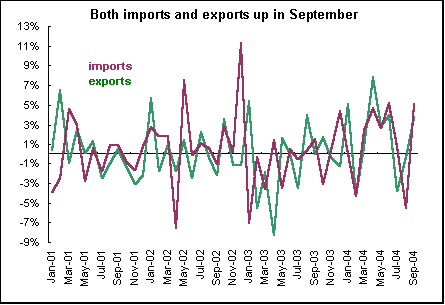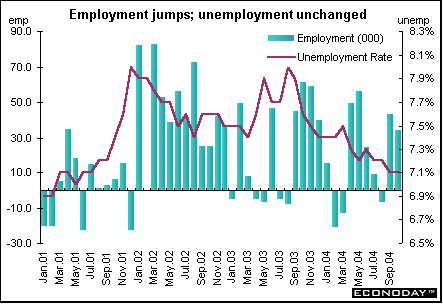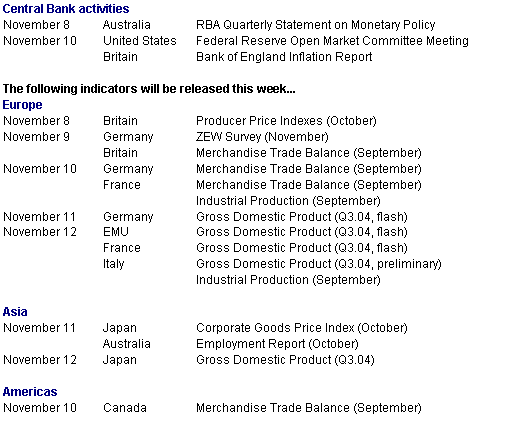Monday, November 8, 2004

Stocks, dollar go in opposite directions
Equities in the United States and elsewhere staged a relief rally as the U.S. election passed uneventfully. Slipping crude prices contributed to the positive mood. And on Friday, a better-than-expected employment report was the proverbial icing on the cake. But the currency markets did not participate. Rather the dollar fell to a new low against the euro Friday on continuing worries about U.S. deficits - both foreign and domestic. Despite this week's equity rally, the Dow industrials continue to trail other major indexes. The indexes in the so-called commodity countries of Australia and Canada lead the pack.

A decisive outcome to the election likely helped the rallies. Equity investors preferred a Bush victory in any case, in part because of tax breaks for dividends and capital gains and perceived gains for such sectors as defense and pharmaceuticals. Another cause for relief was that the election campaign, like the two political conventions and the Olympics, passed without a terrorist attack. That could lower the risk that has been hanging over equities so far this year.
Global Stock Market Recap

Europe and Britain
Crude oil price gyrations continue to move equities in London, Frankfurt and Paris. But with oil prices down for the most part last week, equities were up. U.S. stock investors' enthusiasm for the election results also resonated through the markets as did the favorable employment report. But the indexes then pared gains as the dollar fell to a record low against the euro, eroding the value of sales European companies get in the United States, the region's largest export market.

The FTSE recovered from its October swoon and closed over 4700 on Wednesday once again. The index, which had closed at 4706 on October 6th, lost as much as 141 points to reach a low on October 25th of 4564. It moved even higher late in the week to close on Friday at about 4740. Lower crude prices and lack of action by the Bank of England enhanced investors' positive mood at week's end.
Asia/Pacific
Overall it was a good week for Asia/Pacific stocks as all six indexes followed here posted healthy gains. In Japan, a surprise earnings upgrade from Mizuho boosted the bank sector. The indexes were aided by easing crude oil prices as increased OPEC output and rising U.S. inventories reduced energy crunch fears. On Friday, stocks were boosted by the post-election relief rally on Wall Street.

In pre-U.S. employment report trading (Asian/Pacific markets are closed long before U.S. data are released), Asian stocks rallied thanks to that slide in oil prices. A gain in U.S. crude inventories bolstered confidence that global economic growth and profit growth will be sustained. Exporters including Canon led the gains. Anything that helps consumer spending in the United States automatically triggers interest in exporters. Japan imports virtually all of its energy supplies so any drop in oil prices is viewed positively.
Currencies
While U.S. stock markets rejoiced that the election produced an outright winner, the dollar was pounded by prospects of ever-growing trade and fiscal deficits. This has long been a worry in this market if nowhere else, and the election results brought out the dollar bears in full force. Even euphoria over the U.S. employment report was quickly erased, and the dollar continued its downward plunge to a new record low against the euro. The yen was not immune either. The yen soared to 105.65, no doubt prompting Japanese authorities to prepare once again to intervene to prevent the currency from getting too strong. They haven't officially intervened since the first quarter of 2004. The intervention would be to protect exporters' competitiveness and the nation's export-dependent recovery.
The dollar was down against the euro because traders think President Bush will have a hard time cutting the record current account and budget deficits that spiraled dramatically during his first term. Many analysts say George Bush's reelection is a long-term dollar negative because the deficits are widening as demand for U.S. assets is waning.

The dollar is down about 22 percent on the Federal Reserve's trade weighted major currency dollar index since mid-2001. And according to a report by New York Federal Reserve economists published at the end of October, the need to finance the current account deficit may force the dollar lower and interest rates higher. The twin deficit problem is very big, and the one way of providing a buffer to adjustment is by allowing the dollar to decline in value.
Not all dollar/euro news emanates from the United States though. The euro began its record breaking rise on Thursday after European Central Bank President Jean Claude Trichet failed to protest a four-week advance that could threaten Europe's weak economic recovery. When asked about the euro's gains at a press conference in Frankfurt, Trichet referred to a previous statement by the Group of Seven that "excess volatility and disorderly movements in exchange rates" are undesirable. He stopped short of his January denunciation of "brutal" exchange rate moves. While the stronger euro helps Europe weather soaring crude oil prices (crude is priced in U.S. dollars), it also dampens export growth, currently the main source of what economic growth there is in the EMU.
No change at the banks
Central banks stayed pat last week. The Reserve Bank of Australia did not change its key interest rate on Wednesday and neither did the Bank of England nor the European Central Bank on Thursday.

Reserve Bank of Australia
For the eleventh consecutive month, the Reserve Bank of Australia left its key interest rate unchanged at 5.25 percent. Inflation has abated and there are concerns that rising oil prices may put a damper on global and domestic growth. Third quarter consumer prices posted the smallest gain in more than a year and home lending slowed in September. Slower inflation and borrowing, coupled with concern about oil prices, probably mean the RBA won't raise borrowing costs until sometime in 2005. This year's oil price surge could erode demand for Australian exports, while climbing fuel prices at home could cut consumer spending. Gasoline prices in Sydney, Australia's most populous city have increased 18 percent this year according to fuel monitoring company FuelTrac.
The central bank doesn't release a statement explaining its decision when rates are kept unchanged. The bank will publish its quarterly statement on monetary policy on November 8th. In its last statement, the bank said it "would be surprising if Australian interest rates did not have to increase further at some stage in current expansion."
Bank of England
The Bank of England left its policy interest rate at 4.75 percent on Thursday. Weaker-than-expected third quarter growth combined with little inflation and cooling house prices give the Bank latitude to decide its next move at a later date. The Bank of England has been walking a fine line trying to slow the consumer boom without crimping the long-suffering industrial sector and sending the economy into recession. The latest house price data from Halifax and Nationwide (see indicator scoreboard below) indicate that it may have slowed the consumer boom. And a rising purchasing managers' manufacturing survey indicates it may not yet have crimped the industrial sector. Sterling has been buoyed by interest rates that are 3 percentage points above those in the United States and 2.75 percentage points above the EMU.
The focus is now on the Bank's November inflation report to be released on Wednesday, which bank watchers hope will shed some insight into the monetary policy committee's current priorities. Analysts are divided on whether there is more tightening in the Bank's future. Inflation as measured by the consumer price index is currently 1.1 percent, significantly under the Bank's 2 percent inflation target. However, others think that another 25 basis point insurance increase will occur next year.
European Central Bank
The ECB left its policy interest rate at 2 percent where it has been for 17 months now. With the euro moving up against the dollar, there is little incentive to increase rates, but the level of inflation - currently 2.5 percent in October - makes it difficult to cut them. The ECB has an inflation ceiling of 2 percent to which it rigidly adheres. Maintaining the status quo was widely expected given the EMU's continuing weak domestic growth and high unemployment. The renewed strength of the euro against the dollar also militates against a rate increase because higher interest rates would likely strengthen the euro still further.
At the press conference following the meeting, ECB President Jean Claude Trichet said that risks to inflation and to growth are "augmenting" as oil costs show no signs of easing. The 56 percent jump in oil prices this year has pushed inflation above the ECB's limit for six months and threatens to derail Europe's export-led recovery. Manufacturing growth slowed in October and unemployment remained stuck at 8.9 percent for a 19th month.
Indicator scoreboard
EMU - October seasonally adjusted manufacturing purchasing managers' index slipped to 52.4 from 53.1 in September. France, Germany and Italy were also down from their September levels. Output and orders slowed while higher raw materials prices pushed both input and output prices higher. NTC Research - the firm that calculates the PMIs - attributed the slowdown mainly to the effect of higher oil prices on demand, weaker export competitiveness because of the higher value of the euro, and the nascent slowdown in China. Any index reading above the 50 mark indicates growth while anything below signifies contraction.

October seasonally adjusted services purchasing managers index crept up slightly to 53.5 from 53.3 in September. This was the first increase in the index since May. The indexes were up for Germany, France and Britain but the index was down in Italy to a 13-month low. NTC said services growth had eased significantly since the beginning of the year and said the upturn looks tentative.

September seasonally adjusted unemployment rate remained at 8.9 percent for the 19th month. Of the nine countries reporting data, unemployment was unchanged in five but was up in one and fell in three. There were numerous revisions to August data after the third quarter EU Labor Force Survey. Eurostat estimated that 12.7 million were unemployed in the eurozone.

September industrial producer prices were up 0.2 percent and 3.4 percent when compared with last year. The increase was attributed to energy prices. Energy prices were up 0.6 percent and 7 percent on the year. Excluding energy, the PPI was up 0.1 percent and 2.3 percent on the year.

September real workday and seasonally adjusted retail sales were up 0.1 percent both on the month and on the year. Food, drink & tobacco sales were up 0.6 percent but non-food sales were flat.

Germany - September seasonally adjusted total retail sales were down 0.1 percent and 2.8 percent when compared with last year. Excluding autos, sales were down 0.4 percent and 1.9 percent on the year.

October seasonally adjusted unemployment was up 12,000. This was the ninth increase in a row. It jumped 14,000 in the west but declined by 2,000 in the east. August employment, which lags the unemployment data by two months, was up by 5,000. The bulk of the new jobs were low paying and included the newly self employed. The unemployment rates were unchanged in September at 10.7 percent for pan-Germany and 18.7 percent and 8.6 percent in the east and the west.

September real seasonally adjusted manufacturing orders were down 0.2 percent but up 3.6 percent when compared with last year. Domestic orders were down 1.6 percent, more than offsetting the 1.3 percent increase in foreign orders. The Economics Ministry said there were fewer bulk orders than usual for the month. The Ministry also said it expects an upward revision to the September data. For those firms that failed to report by the cut-off date, the ministry used the firms' reported orders for August in its September calculation. September data, which are generally expected to be stronger due to the lack of a holiday effect, will be used when revisions are made in about two weeks. Basic and semi-finished goods orders sank 2.3 percent but investment goods orders were up 1.5 percent.

Britain - October Halifax house price index sank 1.1 percent but was up 18.5 percent when compared with last year. This was the first time in six months that the annual rate of growth has fallen below 20 percent.

October Nationwide house price index was down 0.4 percent and up 15.3 percent when compared with last year. The Bank of England has predicted that house price inflation will slow sharply over its two-year forecast horizon.
September industrial output was down 0.4 percent and 0.9 percent when compared with last year. The decline was due to a sharp decline in oil and gas output. Manufacturing output, which accounts for about 80 percent of industrial production, was up 0.1 percent and 0.3 percent on the year.

Asia
Australia - September merchandise trade deficit widened to A2.11 billion ($1.6 billion) from A$1.84 billion in August. Consumer goods imports were up and record oil prices pushed up the energy bill. Imports increased to A$15.47 billion. Imports of capital goods, which include machinery, aircraft and business equipment, fell 4 percent. Imports of intermediate goods, which include oil and spare parts, increased 9 percent. Imports of consumer goods rose 8 percent. Exports rose 4 percent to A$13.37 billion. Exports of rural goods, such as meat, wheat and wool, gained 3 percent and exports of non-rural goods, such as iron ore, gold and fuels, increased 4 percent.

Americas
Canada - October employment jumped by 34,300 jobs. Full time jobs were up by 13,200 while part time jobs climbed by 21,100. The unemployment rate was unchanged at 7.1 percent for the second month. Employment was up in retail & wholesale trade and construction, virtually unchanged in manufacturing, and down in finance, insurance, real estate & leasing.

Bottom line
Unlike the central banks that met last week, the Federal Reserve is expected to increase interest rates Tuesday - especially after Friday's very strong employment situation report. If they do increase rates by 25 basis points as expected, this would put the Fed Funds rate on a par with the ECB rate of 2 percent. However, interest rates would still be at a competitive disadvantage with most other countries with the exception of Switzerland and Japan (see graph in central bank section).
Looking Ahead: November 8 through November 12, 2004




